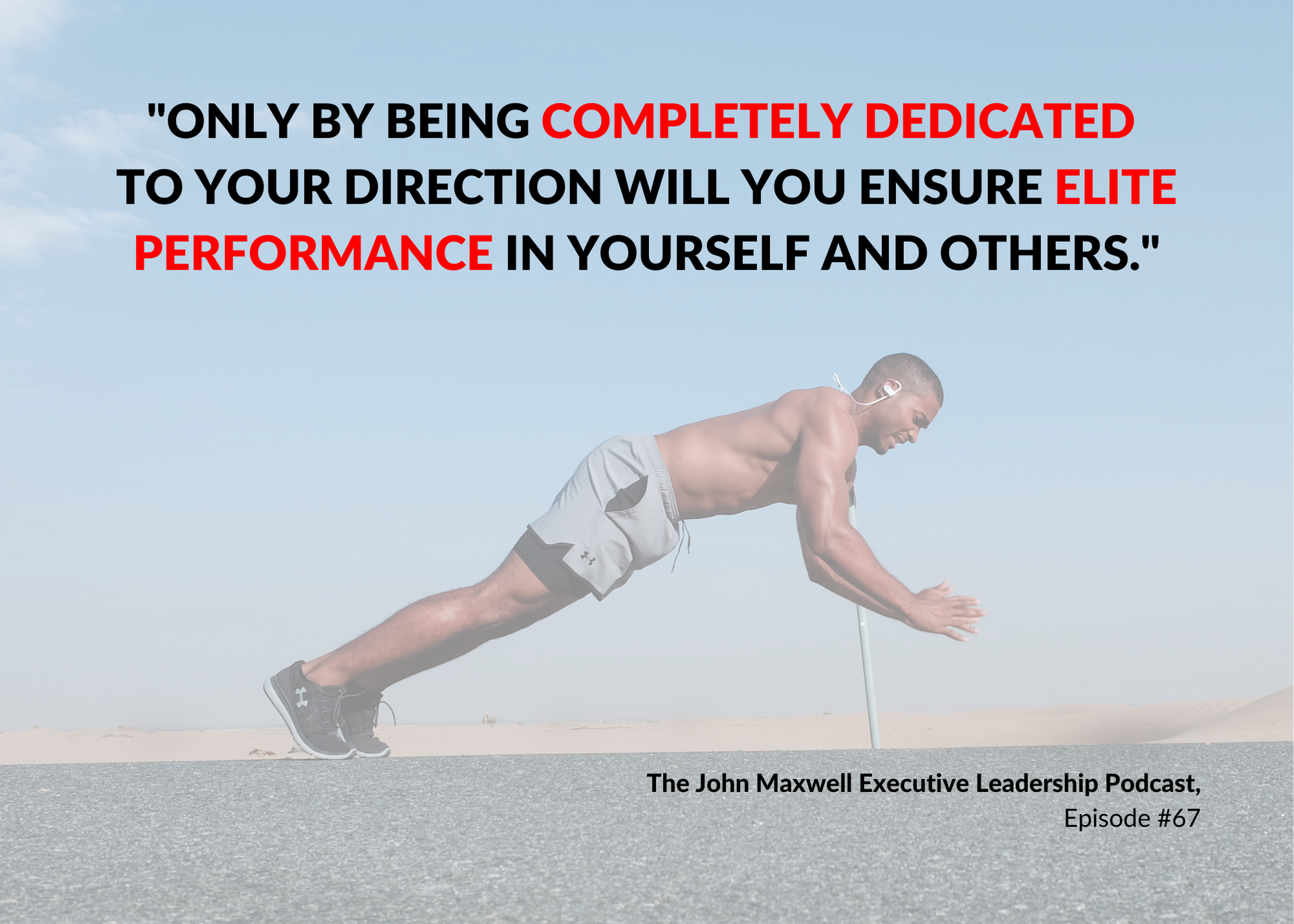Does your leadership demonstrate the 5 hallmarks of elite performance? In Episode #67 of our Executive Leadership Podcast, Chris and Perry go through 5 key habits of elite performers and discuss how incorporating these habits will not only develop yourself as a leader but your team as individuals.
To cultivate leadership development on your team, consider bringing a 5 Levels of Leadership Workshop to your organization this year.
Download our Learning Guide for this podcast!
Read Transcript Below:
Welcome to the John Maxwell Executive Leadership Podcast, where our goal is to help you increase your reputation as a leader, increase your ability to influence others, and increase your ability to fully engage your team to deliver remarkable results. Hi, I’m Perry Holley, a John Maxwell facilitator and coach, and I’m Chris Goede, Vice President with the John Maxwell Company. Welcome, and thank you for joining. As a reminder, if you would like to learn more about the 5 Levels of Leadership or perhaps bring one of us in for a 5 Levels private workshop for your organization, we would love to do that! Please leave a comment or question for Perry and me on the John Maxwell site. We would love to hear from you. Also, we now offer Learning Guides for every podcast episode which can be found on our website.
We’ve gotten a lot of requests for today’s topic, “The Five Hallmarks of Elite Performance.” It’s the holiday season, so we’re going to talk about hallmarks! We recently did a podcast about what it takes to be considered elite in your field. This episode will be about the specific hallmarks of elite performance. But this isn’t just about how to lead yourself, but how to lead and inspire elite performance in others. This is about the greatest reward for us as leaders, inspiring others to perform their best. This should be our focus as leaders.
We also need to make sure we’re seeing past the obvious in our people to see their potential. Hopefully, after today’s podcast, you’ll have some tools to see what others don’t see in your people and bring out the best in them. Seeing potential in others is a critical skill for a leader—to never write people off, but to always see that people have potential. We have 5 hallmark habits of elite performers that we’re going to go through today.
Number one is preparation. Elite performers never take any challenge for granted. They never think, I got this. They prepare and then prepare some more. Elite performers know that the process of becoming a leader is made in the moments most people will never see—the preparation. Muhammad Ali said, “The fight is won or lost far away from witnesses, behind the lines, in the gym, and out there on the road; long before I danced under those lights.”
When we talk about this in regards to leadership, preparation is what you do behind the scenes that you don’t get credit for. Maybe it’s late at night. Maybe you help someone with a report. These things prepare you to become an effective leader. John always says, “When you graduate from high school or college, you receive the diploma that day, but that comes from four years of preparing for that moment.” You cannot graduate immediately, nor can you become an effective leader immediately.
In a previous podcast, we talked about my children and their athletic endeavors to get to the next level. A lot of people think, “Man, I wish I could be playing at the next level.” What they don’t see is the extra work those elite performers put in, the decisions they made that were different than others, the sacrifices, the preparation.
Hallmark number two I’ve noticed about elite performers is dedication. You can’t be elite without being dedicated to what you’re going after, whether it’s your craft, your team, or your leadership. If you allow other things to consume your time, indifference can occur, and your level of intensity toward your goal is lost. To tie this back to our athletic example: elite athletes say are the ones that say, “What off-season?” If you want to be the best leader and reproduce that eliteness in others, there can be no off-season.
Embrace the grind. I didn’t say love the grind. It takes a special person to love the grind of leading every day, because leadership is not easy. But do embrace it. Only by being completely dedicated to your direction will you ensure elite performance in yourself and others. Are you going to dedicate yourself to developing your Level 4 leadership, to developing your team? The decision is on you to do that.
For Elite Performance, You Need Feedback on Your Leadership.
We’re excited to announce our new and improved Organizational Effectiveness Survey (OES). The OES gathers feedback from employees to give leaders and management the knowledge and action plans needed to develop a more effective and productive work environment. Our new version measures 4 areas of your business: Leadership, People, Strategy, and Performance.
Hallmark number three: after preparing and deciding to be dedicated, these elite performers are focused. Their focus on the job before them is incredible. There’s a lot that can distract us these days. I love this quote from Brian Tracy: “The key to success is the focus of your conscious mind on the things you desire, not the things you fear.” Focus is one of the greatest skills you can have. It’s a real difference-maker. We all struggle with it, but it can be improved.
As leaders, we’ve got to focus on controlling the controllables. There are a lot of things going on in your organization, in the economy, and in the world that you cannot control. You can get caught up in all of that and lose focus. If you just focus on what you can control, then you will naturally gravitate towards elite performance. You’ve got to invest your time, your energy, and your attention in those areas that will make a difference. Make sure you’re choosing not to do things that don’t align with your goals. If you do, it’s wasted energy. It’s a lack of focus.
Number four is tenacity. Without tenacity, when things get tough, you quit. There is no elite performance if you quit! Tenacity is about having the courage to continue when things are hard. Do you have the grit to stay after your goal? There are going to be times, as a leader, that you’re going to have to have grit. Tenacity is hard to develop in other people, but the best way to do it is for you to live it out, for your team to see the no-quit approach in you. Demonstrate your tenacity to achieve whatever your goal is. It will be contagious. When things get hard, it’s natural for us to want to back off, but elite performers do not quit.
Number five, our final hallmark, is commitment. You might be wondering, what’s the difference between dedication and commitment? Dedication is an internal decision. It’s about your level of passion. Commitment is external. It’s about your obligation. When you make a commitment, you’re obligated to others. Dedication is more about your internal passion. If you’re committed to living out the 5 Levels of Leadership and developing your people, and if you understand that it’s a cycle that never ends, you will have a significant impact on your people and their journeys.
We all want to be successful. The scoreboard’s very important to us as leaders. We’re competitive. But, at the end of the day, being committed to developing our people into elite performers is how significance will show up in our leadership.

Let me wrap up the key points from today and leave our listeners with a few encouraging thoughts. Today’s topic is really all about mindset. You either have an elite mindset or you don’t. There are many examples of outstanding individuals who gave elite performances, whether on the field or in the workplace, only to end up a complete trainwreck later. I’m sure I was there at a season in my life, and I know some leaders that may still be there. I don’t think that’s elite. I don’t think you can become elite, nor can you reproduce and develop eliteness. However, there is still a great deal we can learn and emulate from elite performers. It’s always there as a goal to strive towards.
You also cannot be elite in just one area of your life. Here’s a great quote from PJ Fleck, an incredibly inspiring head coach at the University of Minnesota: “You can’t be elite in one area of your life but not another. You’re either elite or you’re not.” I love that. He’s talking about the classroom. He’s talking about the football field. He’s talking about the community. It made me think: what does eliteness look like?
I was reading an article the other day and found another great quote. It said, “Being elite does not come from something you turn on and off, but rather from constant behavior.” I thought that was really powerful. If I can get to the point to where I am constantly exhibiting elite behavior in my leadership, it will have a contagious effect, and my team will follow suit.
I’d just like to remind you that if you want to know more about the 5 Levels of Leadership, you can go to visit website at johnmaxwellcompany.com/podcast and leave a question or comment for us there. We’d love to hear from you. And be sure to check out our Learning Guide, downloadable above! We’re always grateful that you join us on these broadcasts. This has been the John Maxwell Executive Leadership Podcast.
Thank you for listening to our Podcasts!
Chris and Perry discuss how managing your own power dynamics can help create a healthier team.
Chris Goede and Perry Holley discuss if quiet quitting is an employee problem or if it's a leadership problem.
It can be easy for a leader to try to do the right thing for others yet shortcut their own integrity when leading themselves.
If you are not intentional about how you communicate culture, adding new people can dilute and derail the culture of your business.
As a leader, you should look for and promote these skills and attributes as you look at developing the next generation of leaders.
Whether coaching a performance challenge or a career discussion, utilizing the GROW model can be a simple yet effective way to help the people on your team grow and improve.
After 200 podcast episodes, Chris and Perry share 5 lesson they have learned that apply to every leader.
Today, Chris and Perry talk about different types behaviour problems that diminishes the capabilities of their team.
Today, Chris and Perry talk about how to identify or what does the potential of your team members look like.
Today, Chris and Perry talk about shifting from pleasing to challenging people is the Relational Shift


